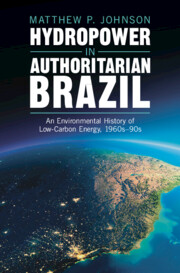Book contents
- Hydropower in Authoritarian Brazil
- Studies in Environment and History
- Hydropower in Authoritarian Brazil
- Copyright page
- Dedication
- Contents
- Figures
- Acknowledgments
- Notes on the Text
- Introduction
- 1 Setting the Scene
- 2 Building “the Big Dam”
- 3 Pharaonic Environmentalism
- 4 Negotiating with Floodwaters
- 5 Environmental Transformations
- 6 The Notorious Balbina Dam
- 7 Aftermath
- Conclusion
- Bibliography
- Index
- Series page
4 - Negotiating with Floodwaters
Impacts on Displaced Communities, 1970s–1990s
Published online by Cambridge University Press: aN Invalid Date NaN
- Hydropower in Authoritarian Brazil
- Studies in Environment and History
- Hydropower in Authoritarian Brazil
- Copyright page
- Dedication
- Contents
- Figures
- Acknowledgments
- Notes on the Text
- Introduction
- 1 Setting the Scene
- 2 Building “the Big Dam”
- 3 Pharaonic Environmentalism
- 4 Negotiating with Floodwaters
- 5 Environmental Transformations
- 6 The Notorious Balbina Dam
- 7 Aftermath
- Conclusion
- Bibliography
- Index
- Series page
Summary
Chapter 4 is about the fate of the families whose land the military regime’s big reservoirs flooded. It covers the twenty-year period from the late 1970s to the late 1990s, when reservoir floodwaters expelled farmers and Indigenous communities from their homes, sending them to uncertain fates. This chapter argues that the military government mostly ignored the social costs of its big dams because it felt pressure to build them quickly and cheaply and becuase it believed its pharaonic environmentalism would satisfy its critics. The military regime provided scant resources to help displaced communities transition to new homes and unfamiliar subsistence practices, and many were left to start anew with almost no financial compensation. For the generals, it helped that most of these people were poor and from racially marginalized groups that had little political clout. Nevertheless, organizations and community leaders associated with the Catholic Church – then under the influence of liberation theology – helped organize dispossessed communities, some of whom succeeded in earning more just compensation.
Keywords
- Type
- Chapter
- Information
- Hydropower in Authoritarian BrazilAn Environmental History of Low-Carbon Energy, 1960s–90s, pp. 125 - 163Publisher: Cambridge University PressPrint publication year: 2024



